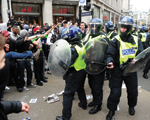Supreme Court riot compensation ruling “will save tax payers millions”
A Supreme Court ruling on compensation for damage caused during the 2011 London riots is bad news for insurers, but will save taxpayers more than £80m, according to a city lawyer.
Donna Goldsworthy of Irwin Mitchell believes the decision will lead to further calls to change the law in this area, with the Home Office carrying out an on-going review of the Riot (Damages) Act, which she believes is “likely to result in changes that will affect compensation claims of this nature in the future”.
The case involved damage caused to a Sony warehouse in Enfield during the London riots in August 2011 , in which goods were stolen and a fire destroyed the warehouse and stock, plant and equipment within.
A Supreme Court ruling on compensation for damage caused during the 2011 London riots is bad news for insurers, but will save taxpayers more than £80m, according to a city lawyer.
Donna Goldsworthy of Irwin Mitchell believes the decision will lead to further calls to change the law in this area, with the Home Office carrying out an on-going review of the Riot (Damages) Act, which she believes is “likely to result in changes that will affect compensation claims of this nature in the future”.
The case involved damage caused to a Sony warehouse in Enfield during the London riots in August 2011 , in which goods were stolen and a fire destroyed the warehouse and stock, plant and equipment within.
The insurers of Sony, the freehold owner of the warehouse, and customers whose uninsured stock in the warehouse had been destroyed all made claims for compensation from the the Mayor’s Office for Policing and Crime (“the MOPC”) under section 2 of the Riot (Damages) Act 1886 (“the 1886 Act”).
The High Court and the Court of Appeal decided that the MOPC was liable, which was not challenged at the Supreme Court. However, the Law Lords were tasked with deciding the quantification of the claims, and the question whether persons who suffer loss when rioters destroy their property can in principle obtain compensation for consequential losses, including loss of profits and loss of rent, under section 2 of the 1886 Act.
The High Court held that section 2 provided compensation only for physical damage and not for consequential losses, but the Court of Appeal reversed that decision.
Now the Supreme Court has unanimously allowed MOPC’s appeal, and ruled that compensation for losses caused by the riot does not extend to loss of profit and lost rent.
As a result, compensation payable by the Metropolitan Police is limited to the costs of repairing the damage done to property during the 2011 riots.
It is a decision which Goldsworthy says will not be welcomed by insurers, but said that it is estimated that it will likely save the UK taxpayer upwards of £80m because many claims for consequential loss have been dependent on the outcome.











